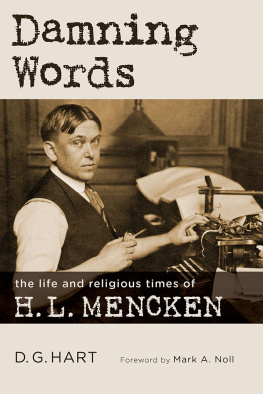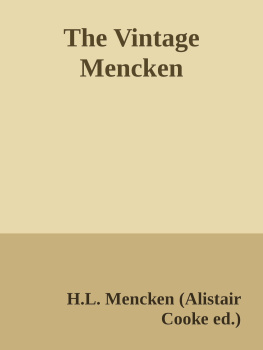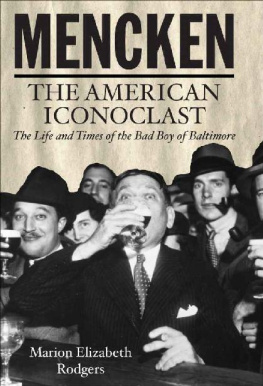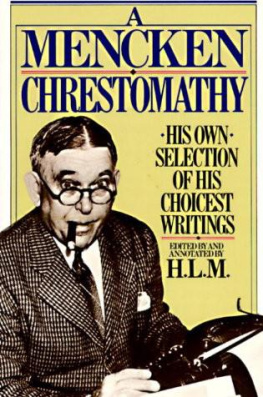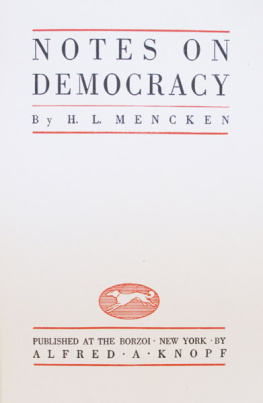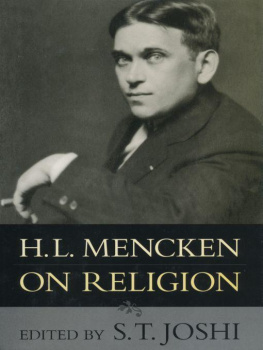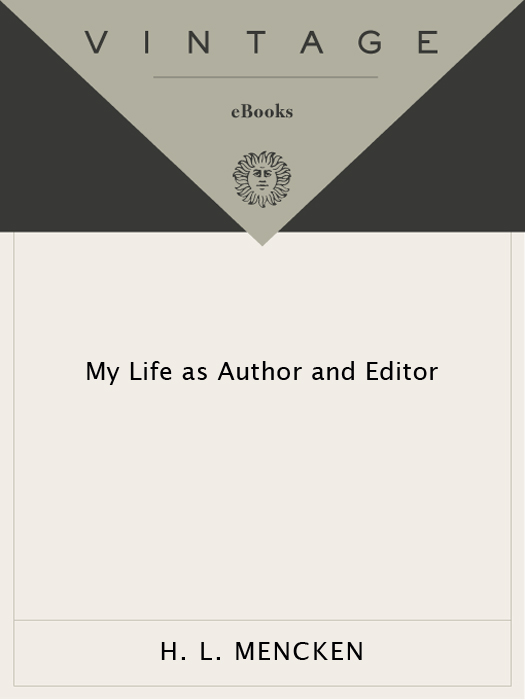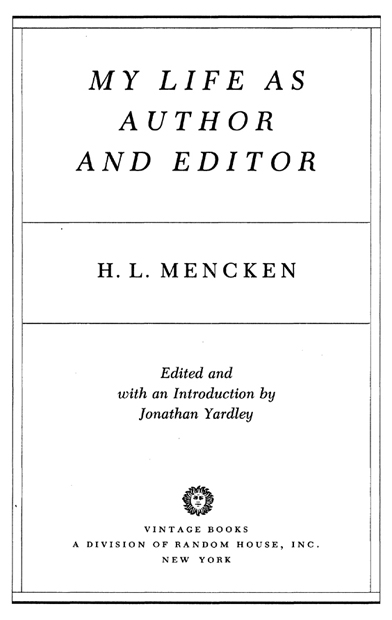ACCLAIM FOR H. L. MENCKENS
MY LIFE AS
AUTHOR AND EDITOR
Incomparable a literary event of some moment. Here is something new from the cynic laureate of the American century. What reader could ask for more?
Wall Street Journal
It crackles with his inimitable, often furious, always witty and laser-precise prose. Mencken, typically American, narrow-minded but big-visioned and energetic, is a craggy mountain on the landscape of American letters.
Mirabella
[A] vivid memoir. [Mencken] was a dissenter, bellicose, unafraid, self-confident, irreverent, independent, and irascible. His recitals of various rowdy episodes enliven the memoir. He seldom used a dull word where a sardonic jibe will do. Few journalists are now as outspoken and fearless as Mencken was, nor do they command the language as he did, nor yet have his disdain for substantial reputations.
Washington Monthly
All the susceptibilities of booboisie and intelligentsia are once more on display here. A reader watches, nostalgically, as Mencken shoots them down like carnival ducks. A matchless guide to American literary life in the years just before and after World War I.
New Criterion
Mencken wrote the liveliest prose of almost any American who ever lived.
Chicago Tribune
Here is quintessential Mencken, a harshly realistic opinion, expressed in terms deliberately offensive to conventional literary views of the time. A merciless assault on mushy optimism.
San Francisco Chronicle
ALSO BY H. L. MENCKEN
THE AMERICAN LANGUAGE
THE AMERICAN LANGUAGE: Supplement I
THE AMERICAN LANGUAGE: Supplement II
IN DEFENSE OF WOMEN
PREJUDICES
NOTES ON DEMOCRACY
TREATISE ON THE GODS
TREATISE ON RIGHT AND WRONG
HAPPY DAYS
NEWSPAPER DAYS
HEATHEN DAYS
A NEW DICTIONARY OF QUOTATIONS
CHRISTMAS STORY
A MENCKEN CHRESTOMATHY
MINORITY REPORT: H. L. Menckens Notebooks
THE BATHTUB HOAX
LETTERS OF H. L. MENCKEN
H. L. MENCKEN ON MUSIC
THE AMERICAN LANGUAGE: The Fourth Edition
and the Two Supplements, Abridged
THE AMERICAN SCENE
THE DIARY OF H. L. MENCKEN
Copyright 1992 by Enoch Pratt Free Library
Introduction, annotations and editing copyright 1992
by Alfred A. Knopf, Inc.
All rights reserved under International and Pan-American Copyright
Conventions. Published in the United States by Vintage Books, a division of Random House, Inc., New York, and simultaneously in Canada by Random House of Canada Limited, Toronto. Originally published in hardcover by Alfred A. Knopf, Inc., New York, in 1993.
Various individuals, institutions and organizations have kindly granted permission to print previously unpublished material.
Owing to limitations of space, all acknowledgments of such permission will be found following the index.
Library of Congress has cataloged the Knopf edition as follows:
Mencken, H. L. (Henry Louis), 18801956.
My life as author and editor / by H. L. Mencken:
edited and with an introduction by Jonathan Yardley.
p. cm.
eISBN: 978-0-307-80888-2
1. Mencken, H. L. (Henry Louis), 18801956Biography.
2. Authors, American20th centuryBiography.
3. EditorsUnited StatesBiography.
I. Yardley, Jonathan. II. Title.
PS3525. E43Z468 1992
818 .5209dc20
[ B ] 92-4496
v3.1
Contents
EDITORS INTRODUCTION
I N F EBRUARY OF 1941 Henry Louis Mencken severed all but the slenderest of ties with the Sunpapers of Baltimore, which he had joined in 1906 and to which he had brought a considerable measure of national and international renown. It was a decision eerily reminiscent of one made a quarter century earlier, when in circumstances almost exactly the same he had taken almost exactly the same step.
In the winter of 1941 as in the fall of 1915, the United States was on the verge of joining those nations allied in world war against an imperial Germany. It was a venture Mencken opposed with as much vehemence as he had ever mustered against any of the innumerable nuisances that stirred his bile; in this oppositionin 1941 as in 1915he was in direct disagreement with the editorial policies of the Sunpapers. Although the editors continued to publish his antiinterventionist, pro-German commentaries, the newspapers hierarchy regarded themand thus himas deeply embarrassing; Mencken in turn was no less confounded by what he considered the imbecilic policies of the Sunpapers, which he saw as both blindly Anglophiliac and inexcusably subservient to his personal bte noire, Franklin Delano Roosevelt.
In 1915 the Sunpapers had squashed Mencken; his column in the Evening Sun, The Free Lance, was terminated and he was reduced to behind-the-scenes labors. In 1941 matters proceeded at a more gentlemanly level, no doubt in acknowledgment of the immense prestige Mencken had accumulated in the interim. Indeed, this time it was Mencken himself who took the initiative and volunteered to cease writing for the Sunpapers, an offer that was accepted with transparent relief. But, whether by his own choice or that of his editors, the effect was the same: Mencken no longer had a public forum in Baltimore, the center of his universe.
Yet however strong his feelings about the war may have been, Mencken accepted his second exile with considerably more aplomb than he had his first. In part, no doubt, this is explained by the differences between the two Germanys; the Kaiser may have been defensible but Hitler was not, and even Mencken found it difficult to make a case on his behalf. In larger part, though, the explanation lies in Menckens age. He was sixty years old, not thirty-five; his beloved wife, Sara, had died six years earlier; and, although the major work of his life was done, he had found a new and comforting occupation.
Mencken had become a memoirist. Bits and pieces of reminiscence that he had originally published in Harold Rosss New Yorker had been put into a book called Happy Days in 1940 and had been a great success; readers who remembered Mencken only vaguely as a disagreeable controversialist, or had forgotten him altogether, were surprised and delighted by these sunny, uproarious tales of life in old Baltimore. They wanted more, and so too did Alfred A. Knopf, Menckens publisher. Thus, even as he left the Sunpapers, Mencken was hard at work on Newspaper Days, to be published later that year, and the concluding volume of the Days trilogy, Heathen Days, would soon be under way.
The satisfactions these books brought to Mencken evidently were considerable, but in reaching back into his immense storehouse of memory he had more in mind than mere nostalgia. Constitutionally incapable of throwing anything away, he had accumulated over four decades at the center of American cultural life a great deal that belonged, not only to my personal curriculum vitae, but also to the literary history of the United States in my time. He meant to make an orderly record of it, for the use of resurrection men in the years to come, but also, I think, to keep alive in those distant years the memory of H. L. Mencken himself.



